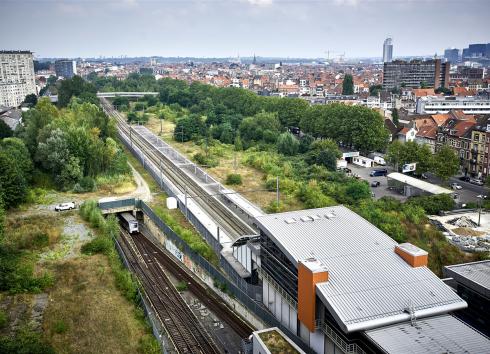The reconstruction plans for the renovation of the 13-hectare wasteland behind the West Station in Molenbeek-Saint-Jean, which include the construction of a recreational swimming pool, have been approved by the Brussels government.
The development project of the area, which is owned by Infrabel, railway company SNCB and the Brussels-Capital Region, will combine living space - 50% of the new buildings will consist of housing, mostly public housing - with areas for recreational and leisure activities, including the pool and a three-hectare park.
"The new planned infrastructure will improve their quality of life. I am very pleased that the recreational water park that we proposed has been included," Catherine Moureaux, Mayor of Molenbeek-Saint-Jean, said.
However, spokesperson for Moureaux, Rachid Barghout, highlighted that this latest development signifies the approval of the Outline Construction Plan (RPA), and that there is still much more work to do before the project is finalised.
"This decision essentially relates to the outline of what will be developed, but now we have to discuss more concrete plans for how everything will be developed," he told The Brussels Times.
"Now, we also have to find a developer and private investors who will be building and investing in the creation of the recreational pool," he added.
According to Barghouti and a study which was undertaken two years ago, there is a lot of demand for the construction of a recreational swimming pool, similar to Océade at Heysel, which recently had to close.
Molenbeek city councillor Jef Van Damme said he hoped that "within five years we hope that the people of Molenbeek will be able to take a refreshing dip in it for the first time."
The bigger picture
Also included in the plans is the creation of a new footbridge that will replace the current passageway, the only connection between the densely built-up and slightly older east area and the west, which has been developed more recently.
"This will be completely rebuilt, but it will also be made safer for people to use it more frequently," said Barghout.
All parties working on the project hope that people will be encouraged to make the modal shift to using public transport more often, as the current wasteland is located near a mobility hub that connects the train station with the entire city by means of trams, metros and buses.
So far, many private investors have shown interest, which could cut down the contribution of public money for the project. Some money is also being released from the urban renewal contract for the construction of the park.

